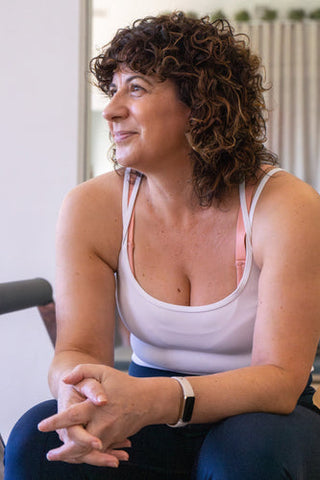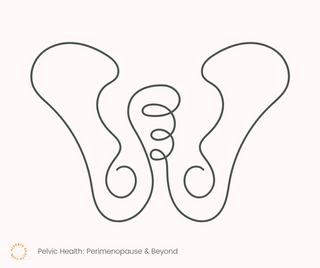Tell us about yourself and your qualifications, Ellie!
I’m one of the Aleenta Adelaide Barre Tenders and Reformer Pilates instructors. I’ve also been a physiotherapist for over 16 years and spent lots of this time treating and teaching Pilates to pregnant and post-natal women. My further study includes Australian Physiotherapy Association courses in prenatal exercise and women’s health, and Polestar Pilates International training in women’s health. Perhaps one of the most informative experiences I’ve had was actually being pregnant - 5 and 7 years ago now!

Can I exercise during pregnancy?
For the vast majority of women, yes you absolutely can and should exercise while pregnant. So long as you are healthy with an uncomplicated pregnancy, exercise has been shown not only to be safe for mum and bub, but also has numerous health benefits. These perks include reduced back pain, improvements in overall fitness, assisting in maintaining a healthy weight during and after pregnancy, and may also reduce the risk of gestational diabetes, preeclampsia and increase the likelihood of having a vaginal delivery.

Of course it is important to chat with your obstetrician, midwife or GP before beginning exercise during pregnancy. Some women can have health conditions or pregnancy complications which can limit the types of exercise they can safely do.
If I didn't exercise before pregnancy, what type of fitness is a good place to start now that I am pregnant?

Brisk walking or swimming is great, and once you’ve built up a bit of fitness a barre class would be ideal (taking it at your own pace of course!). Much of barre is done standing! Pilates is also great for maintaining abdominal and pelvic floor strength. Just make sure your instructor is aware of how many weeks you are, and is able to give appropriate alternatives. Lying on your back or tummy will be a no-no for a while, as will those ab curls (so disappointing I know ;)). If you’re a total newbie it’s important to begin slowly and gradually, even if it’s just a few minutes per day. You can then gradually add another 5 minutes to your workouts each week.
When should I stop exercising during my pregnancy? Can I exercise during the 3rd trimester?
So long as you and baby are healthy and exercise isn’t causing pain, there’s no reason to stop exercising in the third trimester. Of course, you may need to slow down a little as you get bigger, but pregnancy is different for every single woman. I have seen some clients bounce out of their last Pilates class the day before giving birth, whereas other women become so uncomfortable they are unable to continue attending classes beyond 30 weeks. If you have any concerns about symptoms during or after exercise you should consult your health provider. Otherwise, go for it!

What types of exercise or specific movements should I avoid?
- Contact sports where there is a risk of taking a ball to the belly
- Activities with a risk of falling such as climbing, skiing, horse riding, gymnastics and skydiving
- Scuba diving
- High altitude sports
- “Hot” yoga or Pilates due to the risk of overheating
Other, less obvious ones include:
- Loaded abdominal work, such as stomach crunches, curls, roll ups, etc. These can cause strain on your abdominal and pelvic floor muscles, and are not especially helpful while your belly is expanding. Focus instead on strengthening your deeper abdominals, pelvic floor, gluteals, back muscles, shoulders and legs.
- Lying on your back or tummy should be avoided, especially from 20 weeks onward due to the weight of the baby and uterus restricting flow through the major blood vessels
- Repetitive high impact activities which put a lot of strain on the joints (e.g. jumping)
- Very strong, sustained stretches which can overstretch ligaments and joints
- Sustained inverted positions, such as prolonged downward dog, are also best avoided
- There are other movements that may exacerbate a pre-existing condition. If you have any injuries or pain I would strongly recommend you get checked out by a physio who deals with women’s health. They should help guide you on what exercises will be best for your body.
I've had bub! When can/should I come back to exercise?
I recommend waiting until your 6 week check with your doctor or midwife before you return to exercise. They will check that you’re healthy and have healed from your baby’s birth. Usually you will need to go easy for a while, and build your fitness back up gradually, especially with regard to the abdominal and pelvic floor muscles. This will also depend on what type of birth you had, eg. often women need a longer recovery time after having a caesarean.

In those early days after your baby arrives you might enjoy taking some light walks or doing a few gentle stretches if you feel up to it. Once you do get back to exercise it’s an excellent way to look after yourself both mentally and physically, which helps you be the best mummy you can be!








